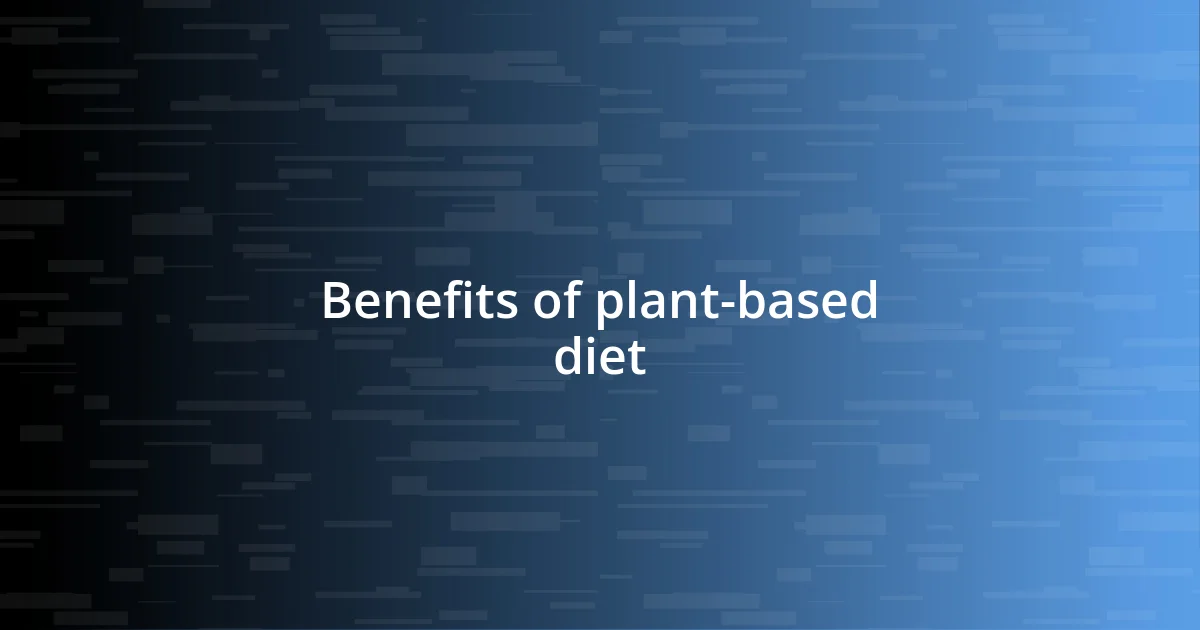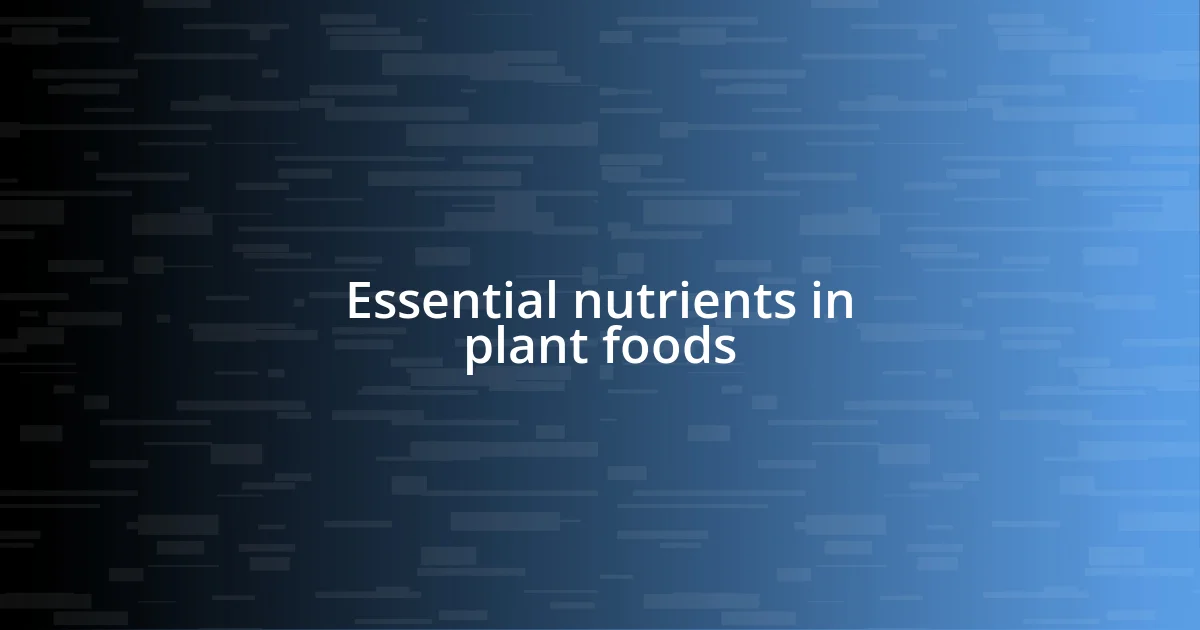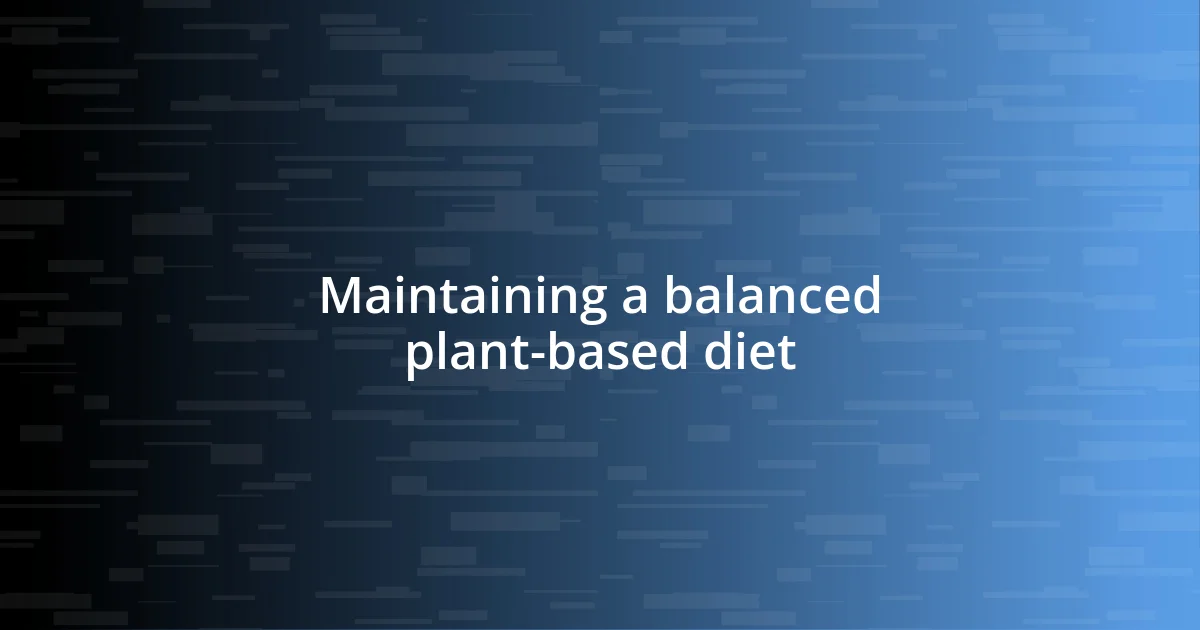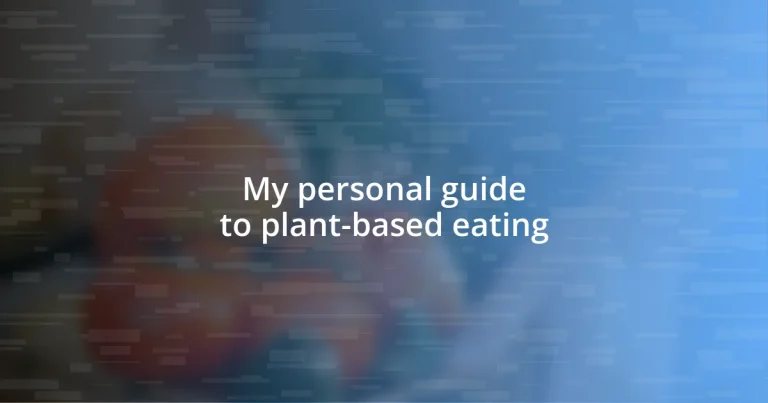Key takeaways:
- Embracing a plant-based diet enhances overall health by improving nutritional intake, weight management, heart health, and mood while also benefiting the environment.
- Understanding essential nutrients, such as protein, iron, and fiber from plant foods is crucial for maintaining energy levels and digestive health.
- Meal planning and experimenting with recipes are key strategies for transitioning to a plant-based diet, helping to simplify the process and keep meals exciting.

Understanding plant-based eating
Understanding plant-based eating goes beyond just swapping out meat for veggies; it’s a lifestyle that invites you to embrace whole, unprocessed foods. I remember my first experience with a plant-based diet; it felt like stepping into a vibrant world where each meal burst with color and flavor. Isn’t it fascinating how food can transform not only our plates but also our health and wellbeing?
When I switched to a plant-based diet, I found myself more attuned to my body’s signals. Initially, I wrestled with cravings for my favorite dishes, but I soon realized that nourishing my body with whole grains, fruits, and legumes offered a sense of vitality that I hadn’t experienced before. Have you ever noticed how what we eat can impact our mood and energy levels? It’s a profound connection that many overlook.
Plant-based eating can be incredibly diverse; it opens up a pantry filled with spices, grains, and vegetables from around the world. I love experimenting with new recipes, like trying my hand at a spicy chickpea curry or whipping up a refreshing quinoa salad. The beauty of this approach lies in its adaptability—what’s your favorite ingredient, and how could you reinvent a dish to make it plant-based? Exploring these possibilities can be both fun and rewarding!

Benefits of plant-based diet
Shifting to a plant-based diet has brought me countless benefits that I never anticipated. My experience has shown that this lifestyle not only boosts physical health but also enhances mental clarity and emotional well-being. It was astonishing for me to realize how reducing processed foods and prioritizing whole foods led to more stable energy levels throughout the day. Have you ever felt that mid-afternoon slump? I no longer experience it, and it’s such a relief to feel consistently energized.
Here are some key benefits I’ve discovered through my journey with plant-based eating:
- Improved Nutritional Intake: A focus on fruits, vegetables, and whole grains means I’m getting essential vitamins and minerals that were sometimes lacking in my diet.
- Weight Management: I found it easier to maintain a healthy weight, as plant-based foods are generally lower in calories and higher in fiber, keeping me full longer.
- Heart Health: My cholesterol levels have improved since I made the switch, significantly reducing my risk of heart disease.
- Enhanced Mood: Eating nutrient-rich foods has positively impacted my mood; I genuinely feel happier and more balanced.
- Environmental Impact: I feel good knowing that my food choices are more sustainable, supporting the planet in a small way with each meal.
These changes have profoundly shaped my daily life, and I relish the opportunity to share them. Every successful meal reminds me of just how rewarding this journey can be.

Essential nutrients in plant foods
When it comes to essential nutrients in plant foods, I’ve learned that understanding what our bodies need is crucial for making informed choices. While fruits and vegetables are often celebrated for their vitamins, it’s the combination of nutrients they provide that truly supports our overall health. I recall the time I discovered the power of iron-rich foods like lentils and leafy greens; it was an eye-opener! The energy boost I felt after incorporating them more regularly into my meals was remarkable. Have you thought about the role of iron in your diet? It’s so essential for keeping our blood healthy and our energy levels stable.
Similarly, it’s fascinating how plant foods can be a complete source of protein when combined thoughtfully. For instance, pairing rice with beans creates a complete amino acid profile just like animal protein does! In my own experience, I found that using diverse sources, including whole grains and legumes, made me feel stronger and fuller. It’s truly empowering to know that by blending food types, I can customize my nutrition to fit my lifestyle, feeling good while doing it.
It’s also worth mentioning the power of fiber found in plant foods, which I’ve come to regard as my digestive best friend. Increasing my fiber intake by munching on fruits, vegetables, and whole grains has greatly improved my overall digestion. I felt a shift in my gut health—fewer uncomfortable bloating episodes and a new level of regularity. Have you noticed how a fiber-rich diet can indeed transform your days, making you feel lighter and more energetic?
| Nutrient | Sources |
|---|---|
| Protein | Lentils, beans, quinoa, chia seeds |
| Iron | Spinach, chickpeas, fortified cereals |
| Fiber | Oats, apples, broccoli, whole grains |
| Calcium | Tofu, almonds, kale, fortified plant milks |
| Omega-3 Fatty Acids | Flaxseeds, walnuts, chia seeds |

Meal planning for beginners
When I first started meal planning for a plant-based diet, it felt overwhelming. The sheer variety of fruits, vegetables, grains, and legumes can be daunting. But what helped me was setting aside a little time each week to map out my meals. I found that brainstorming simple, go-to recipes made the process smoother. Have you ever felt that sense of accomplishment when everything’s prepped and ready? It’s incredibly satisfying!
One strategy that worked wonders for me was batch cooking. I’d cook larger portions of grains and legumes on a Sunday, which saved me time during the busy week. I remember the first time I made a big batch of quinoa; it became a versatile base that I could easily transform into salads, wraps, or bowls. Visiting my local farmer’s market also inspired me to include seasonal produce in my meals, keeping things fresh and exciting. Have you tried exploring your local markets to find unique ingredients? It’s a great way to stay motivated!
Another key part of my meal planning is having a well-stocked pantry. Key items like canned beans, grains, and frozen veggies are lifesavers on hectic days. They allow me to whip up quick, nutritious meals without stress. I often recall those evenings when I was too tired to cook; I could easily create a hearty veggie stir-fry in less than 20 minutes, using whatever I had on hand. Finding a rhythm that works for you makes all the difference. What are your go-to pantry staples? Embracing this planning approach really transformed my eating habits and made the transition enjoyable.

Easy plant-based recipes
One of my favorite easy plant-based recipes is a vibrant quinoa salad. Just mixing cooked quinoa with chopped bell peppers, cucumbers, and a handful of fresh herbs like parsley or cilantro gives it such a refreshing twist. I remember the first time I served it; my friends couldn’t believe how delicious and hearty it was, and it made me realize that plant-based meals can be both satisfying and colorful! When was the last time you enjoyed a dish that was as much a feast for the eyes as it was for the palate?
Another go-to recipe that makes weeknight dinners a breeze is a chickpea curry. Simply sauté some onions and garlic, add canned tomatoes, and toss in canned chickpeas along with your favorite spices to simmer for about 20 minutes. In that time, I like to prepare brown rice or whole grain naan to serve on the side. It’s a cozy meal that fills the home with incredible aromas. I often feel a wave of comfort just from the thought of it. Doesn’t it feel nice to have recipes that are not just easy but also offer a big hug of flavor?
On days when I want something super quick, I whip up a smoothie bowl. I blend frozen bananas, spinach, and almond milk until creamy and then top it off with granola, seeds, and a drizzle of nut butter. The first time I made this for breakfast, I was amazed at how something so simple could be so nourishing. It’s like eating ice cream for breakfast, and who wouldn’t love that? Have you found a quick recipe that makes you jump out of bed excited? I think this kind of joy in food is what keeps me motivated on my plant-based journey!

Tips for transitioning diets
Transitioning to a plant-based diet can feel like a huge shift, but I found that starting small made a big difference. One tip that truly helped me was to replace one meal each day with a plant-based option. When I committed to Meatless Mondays, I discovered how delicious simple veggie dishes could be—like a hearty lentil soup that warmed my soul. Have you ever discovered a new favorite dish just by trying something new?
Another strategy I embraced was experimenting with flavors and textures. I vividly remember my first time making a cauliflower steak; drizzling it with a zesty lemon-tahini sauce transformed it into a flavorful main dish. It’s exciting to realize that you can find joy in experimenting. What have you tried that surprised you?
Creating a supportive community also played a significant role in my transition. I joined online groups and local meetups where I could share recipes and ask for advice. It was empowering to surround myself with people who shared the same journey. I often found motivation in their success stories, which made me feel less alone. Have you considered finding a group to share your experiences with?

Maintaining a balanced plant-based diet
Maintaining a balanced plant-based diet can feel daunting at times, especially when it comes to ensuring you’re getting all the essential nutrients. I remember when I first started, I was so focused on adding more vegetables that I overlooked the importance of protein. Incorporating a variety of sources, like legumes, nuts, and seeds, not only fuels my body but also keeps meals interesting. Have you found that some plant-based ingredients surprise you with their protein content?
Just as important is paying attention to key vitamins and minerals, such as B12 and iron. I learned through trial and error that it’s often necessary to supplement these nutrients, especially when you’re cutting out animal products. For instance, I started incorporating fortified plant milks and nutritional yeast into my diet. These not only enhanced the flavor of my dishes but also eased my concerns about deficiencies. What options have you explored to ensure you’re covering your nutritional bases?
Lastly, I’ve found that variety truly is the spice of life. I aim to explore different cuisines, which helps me keep my meals not just balanced but also exciting. One memorable evening, I decided to cook a Moroccan-inspired tagine loaded with chickpeas, apricots, and spices. The flavors danced on my palate in a way that reminded me of how delightful plant-based eating can be. Have you experimented with a new cuisine that changed your perspective on plant-based food? Embracing diversity in your meals can cultivate not just a balanced diet but also a deep appreciation for the vibrant world of plant-based eating.














